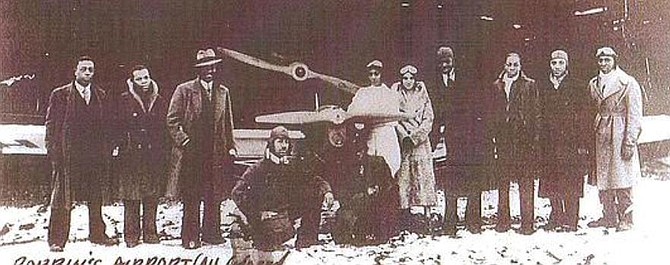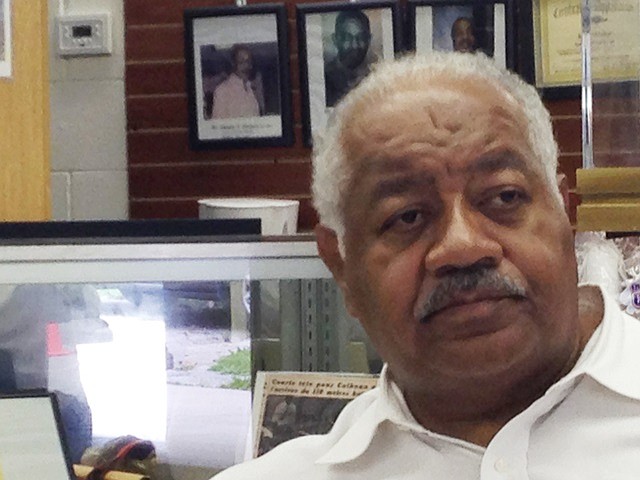Robbins Historian Promotes Village's Rich History to Inspire Youth
The first black-owned airport in the nation. Black leadership for nearly a century. And former residents with big names, like Dwyane Wade and Keke Palmer.
Those are just a few of the examples that Tyrone Haymore uses to argue that Robbins, Ill. is the most historical black community in the United States.
Haymore, the founder of Robbins History Museum, has made the declaration as a speaker at various events and on the museum’s website, in hopes of creating a more positive image for Robbins and to inspire youth who live there, as the village gears up in celebration of its 100th birthday in 2017.
“Robbins is definitely the most historical black town in America,” Haymore said.
The south suburban village has always had black leaders, Haymore added. It’s long history is also credited with influencing Black Nationalists and Pan-Africanists.
Robbins, founded in 1917, is one of the oldest black communities in America. It was reportedly established by mixed-race blacks who had trouble living in black and white communities in Chicago.
“Robbins started at a time in history when African-Americans were looking to establish their lives away from discrimination,” said Lionel Kimble Jr., associate professor of history at Chicago State University. Robbins allowed blacks a place to live and not face racism from whites like some blacks did in the Bronzeville area then.”
One of the village’s original settlers was Samuel G. Nichols, whose granddaughter, Nichelle Nichols, became one of the pioneering blacks to star on network television.
Nichols, born in a Robbins home built by her grandfather, portrayed Lt. Uhura on the television program, Star Trek.
Her father, Samuel E. Nichols, served as the village’s mayor from 1929-31.
Around the same time Nichols ended his term as mayor, the Robbins Airport was founded.
Haymore was motivated to start the village’s museum because of the airport.
In 1931, Cornelius Coffey and John C. Robinson opened the first black owned- and –operated airport in the U.S. The pair are credited with training African American pilots who fought in World War II, also known as, the Tuskegee Airmen.
At least 10 of the group’s pilots are from Robbins, Haymore said.
The museum, a 40-by-40 square foot facility, opened in 2010 touting former residents like the NBA’s Dwayne Wade and actress Keke Palmer.
The museum displays other notable residents, such as S.B. Fuller, the late multimillionaire businessman and gospel singer, Albertina Walker.
It also showcases local black political figures.
In fact, Black Nationalist Marcus Garvey spent time in the village and reportedly purchased musical instruments for youngsters in the community.
Timuel Black, a respected Chicago historian, said aside from its political history, Robbins had a very active musical and entertainment scene in the past.
Comedian Dick Gregory spent time performing in Robbins, Black said.
But in recent years, news hasn’t always been positive about Robbins, as it is frequently making the headlines for issues involving crime. Unsavory news stories have cropped out of Robbins including one of a former police chief arrested on drunk driving charges and one involving the fact that at least 203 rape kits have been collected in the locale of Robbins since the mid-’70s, but were never used to properly investigate sexual assaults.
Robbins has nearly half the population it did during the 1970s, Haymore acknowledged. Today, the population is about 5,000 residents.
But its rich history is something the village can build on, Haymore said.
Black, the 96-year-old historian, agrees.
While Black wouldn’t say whether the village is the most historic black community in the U.S., he acknowledged that it is certainly a noteworthy black town.
“It has always been a black village,” Black said. “Robbins was built specifically for blacks.”
Latest Stories
- One Night Only Performance Show Dance Company Entering ‘New Horizons’
- New Choice Intervention Provides Much Needed Mental Health Services To The Community
- University of Chicago Program Brings Mavis Staples To Campus
- Larry’s Barber College Set For Expansion Of Facility And Education Programs
- Art Exhibit Shows And Tells The Stories Of Widows
- Introducing Shot Bar's New Location
- Illinois Reparations Coalition Advocates for Guaranteed Income Program as Drug War Reparations
- Reps. Kelly, Balderson Introduce Legislation to Combat Scams Targeting Seniors
- Gov. Pritzker Highlights Proposal to Eliminate $1 Billion in Medical Debt
- Customers urged to stay connected if they are behind on bills
Latest Podcast
Sydney Blaylock-The local skater with national experience



